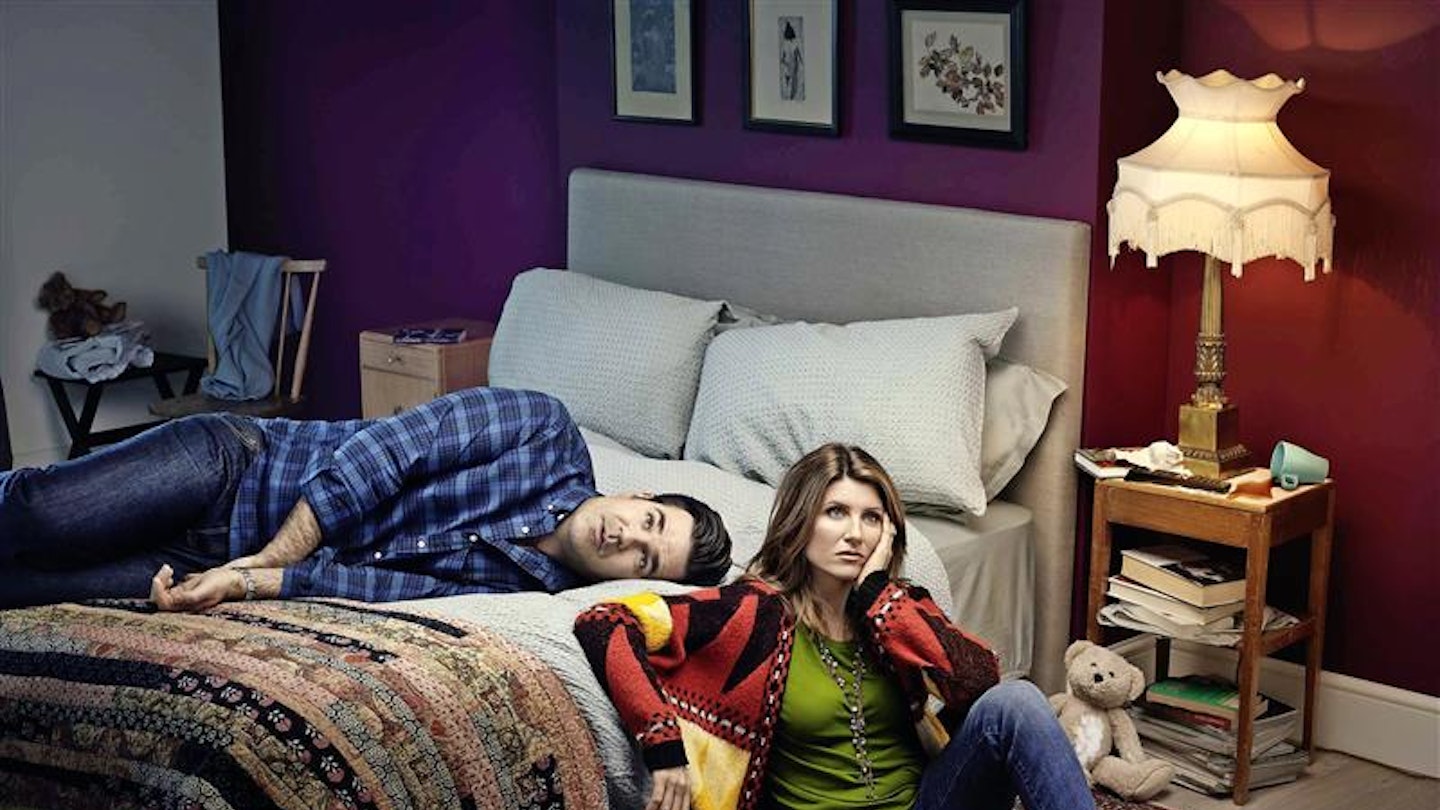British reality star, the Made in Chelsea alumnus Jamie Laing recently confessed that all is not swinging from the chandeliers a year after his nuptials. Laing, 35, who hosts the Newlyweds podcast with wife Sophie Habboo, 30, admitted that, since he put a ring on it, he has become ‘lazy’ in the bedroom. Habboo maintains that he is ‘bog standard’ in his predilections and ‘can’t be bothered’. The presenter elaborated: ‘Once I rolled on top of Sophie and she said: “Oh, get on with it”.’ Their candidness came as many were still traumatised by former sex god Robbie Williams’s declaration: ‘Everyone knows there’s no sex after marriage,’and that, frankly, he’d rather eat a tangerine.
How the mighty are fallen. One minute you’re a shag-happy, erotic Duracell bunny, the next you’re comatose, sporting bed socks, beneath a sign reading: ‘Do not disturb’. My partner and I aren’t even married. And, yet, a decade on from meeting, we seem more aroused by an early night than all-night exploits, a blackout mask has replaced my La Perla blindfold, and it is the dog – not Terence – who yearns to bask between my thighs (whippets crave warmth). There was a time when my sex life was my life. These days, I wouldn’t rather have an orange, but I might just trade it for a bath.
We’re far from alone. When I ask around about passion in long-term relationships, the first response I receive is a curt: ‘Oxymoron’. Others allude to weekly ‘maintenance sex’ that ‘actually happens every month’. A chap who has been hitched for 25 years tells me that ‘relations’ require ‘recourse to the wank bank’, another that it’s a case of ‘birthdays and Christmas’. In fact, the only individual able to brag about her sex life pauses after a couple of minutes to say: ‘Oh, wait, you mean with my husband? Christ, no. That would be a fetish too far.’
A YouGov survey released in 2020 revealed that sexually active Brits do it an average of once a week. Although, whether this is a genuine figure, or some fictional fantasy remains moot. Those in their late 20s are more likely to engage in weekly intercourse than any other cohort, with almost half (43%) of 25- to 29-year-olds reporting this. Two in five people (38%) aged 35 to 39 had not done the deed in the past seven days. By 40 to 44, a fifth were reporting having no sex whatsoever. By 74, this figure was 57%.
‘Those late twentysomethings are clearly single,’ snorts a colleague with whom I share these factoids. She has a point. When I was a lone wolf, I would seize every opportunity to make the beast with two backs with whomever I was seeing. Once you’re an item, complacency sets in. Come lights out, Terence is glued to TikTok, while I pore over Substack, the dog not merely barrier-method contraception, but a barrier full stop. And yet, as a ménage, our trio is rapturously happy, bedtime the most blissful part of our day.
Partly, this is hormonal. Initial lust feeds off a torrent of testosterone and oestrogen. The ensuing infatuation phase relies upon an invigorating cocktail of neurotransmitters including adrenaline, noradrenaline, dopamine, serotonin, and phenylethylamine – in layman’s terms, an entirely head-f*cking bolt of stimulants.
The commitment stage that supplants this chemical high at around 18 months is the product of the bonding hormones oxytocin and vasopressin. Both are believed to interfere with dopamine and noradrenaline pathways, heightening attachment, but sabotaging sexual craving. Hence that most poignant of paradoxes: at the point at which you have never loved someone more, you may never have wanted to sleep with anyone less.
Science suggests that the monotony of monogamy hits women harder. A 2017 study of more than 11,500 British adults found that for ‘women only, lack of interest in sexwas higher among those in a relationship of over one year in duration,’ and that ‘women living with a partner were more likely to lack interest in sex than those in other relationship categories.’ Men appear to be happy so long as they’re having sexof any sort, even long-term; women not so much.
And, yet, society’s final sexual taboo is admitting to not doing it, or not as much as Hollywood would have us believe. And maybe that’s alright, natural even? Life takes over, desire ebbs and flows, relationships pass through phases. When I was single, physical intimacy was often a substitute for genuine intimacy, matters heightened by novelty, or drama over whether we would ever do it again. Actual intimacy may not be as athletic, but proves more fulfilling.
An evening with single friends is enough to remind me that flings also mean frustration. As one ally sighs: ‘Why only beer goggles, why not permanent blinkers?’ At least relationships leave you with regret for the intercourse you haven’t had, rather than the activities you engaged in. Besides, when Terence and I do find ourselves dogless and undistracted, sex still has the capacity to inspire shock and awe, knock my (bed) socks off. To prioritising quality over quantity, I give an orgasmic ‘Yes!’
